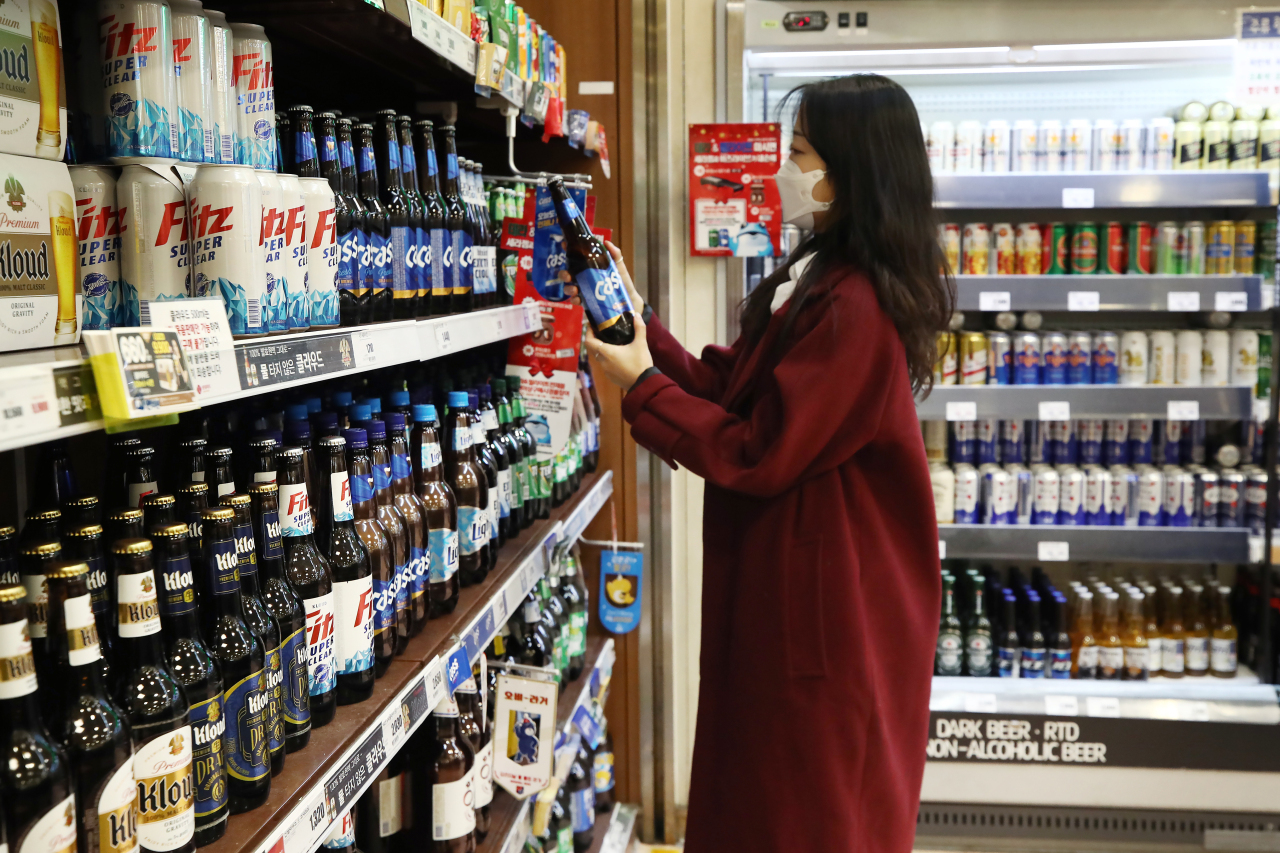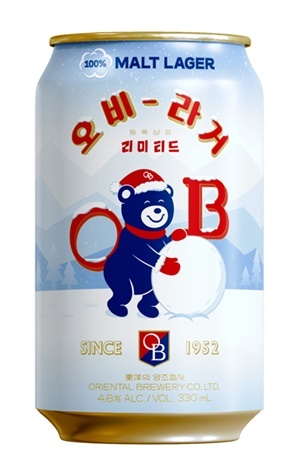With year-end parties canceled, alcohol industry targets home drinkers
Brands alter strategy as third wave of coronavirus kills on-premise sales
By Yim Hyun-suPublished : Dec. 15, 2020 - 17:11

Alcohol companies are eyeing home drinkers rather than bar goers during the first pandemic year-end season as a third wave of the COVID-19 outbreak threatens hospitality businesses across South Korea.
In a more normal setting, restaurants and bars would be packed with group dinner reservations as the year draws to a close. But not this year, with venues being forced to close after 9 p.m. in Seoul and surrounding areas under strict social distancing rules.
“As the hospitality sector has had its business capacity limited by the over 1,000 daily coronavirus cases, the industry is in poor shape at the moment,” one official at liquor manufacturer HiteJinro said. The country’s daily virus tally came in at 880 on Tuesday.
“It’s the government’s policy (to limit opening hours) which is for the good of public health and we are in no place to protest that. But we are nonetheless taking a hit, which is forcing us to focus on the home drinking market instead.”
December is the peak sales season for the industry, along with the summer months.
Indicative of that, nearly 20 percent of wine sales at convenience store chain Emart24 last year occurred during the month, with over half of the monthly sales generated in the last ten days, including Christmas and New Year’s Eve.
As the pandemic decimated restaurant sales and changed people‘s drinking patterns, wine has enjoyed a surge in popularity, as it is preferred by home drinkers.
HiteJinro posted an annual sales growth of 11.2 percent for wine on Monday. Imported whiskey and beer, which are more reliant on bar sales, are set to shrink in volume this year, according to data from the Korea Customs Service.
While work dinners and group drinking typically involve large quantities of somaek, which is made of soju and beer, alcohol beverage makers are prioritizing packaging and diversifying their range of products for those drinking at home.
Oriental Brewery is releasing a “winter special package” of its malt lager brand OB Lager featuring its mascot LalaBear on Thursday.
“Since year-end parties are not taking place, we have released limited editions and at-home party packs for those drinking at home,” one OB official said.
In a more normal setting, restaurants and bars would be packed with group dinner reservations as the year draws to a close. But not this year, with venues being forced to close after 9 p.m. in Seoul and surrounding areas under strict social distancing rules.
“As the hospitality sector has had its business capacity limited by the over 1,000 daily coronavirus cases, the industry is in poor shape at the moment,” one official at liquor manufacturer HiteJinro said. The country’s daily virus tally came in at 880 on Tuesday.
“It’s the government’s policy (to limit opening hours) which is for the good of public health and we are in no place to protest that. But we are nonetheless taking a hit, which is forcing us to focus on the home drinking market instead.”
December is the peak sales season for the industry, along with the summer months.
Indicative of that, nearly 20 percent of wine sales at convenience store chain Emart24 last year occurred during the month, with over half of the monthly sales generated in the last ten days, including Christmas and New Year’s Eve.
As the pandemic decimated restaurant sales and changed people‘s drinking patterns, wine has enjoyed a surge in popularity, as it is preferred by home drinkers.
HiteJinro posted an annual sales growth of 11.2 percent for wine on Monday. Imported whiskey and beer, which are more reliant on bar sales, are set to shrink in volume this year, according to data from the Korea Customs Service.
While work dinners and group drinking typically involve large quantities of somaek, which is made of soju and beer, alcohol beverage makers are prioritizing packaging and diversifying their range of products for those drinking at home.
Oriental Brewery is releasing a “winter special package” of its malt lager brand OB Lager featuring its mascot LalaBear on Thursday.
“Since year-end parties are not taking place, we have released limited editions and at-home party packs for those drinking at home,” one OB official said.

HiteJinro’s popular liquor brands Chamisul and Jinro have also released Christmas limited editions while Pernod Ricard, the drinks giant behind Absolut Vodka and Ballantine‘s, recently unveiled the ready-to-drink Kahlua Espresso Martini Can -- described by the company as a “cocktail that reflects trend of drinking alone.”
Earlier this year, the French company also released smaller bottles of its rum brand Malibu that are the size of a regular soju bottle, targeting millennial and Gen Z consumers.
As efforts to prioritize a different audience continue, about 60 percent of sales now occur from off-premise retail outlets while 40 percent come from drinking establishments, the HiteJinro official explained, adding the figures had swapped places during the pandemic.
But the rise of home drinkers in sales share does not translate to an overall surplus for alcohol companies as sales generated from home drinkers are not enough to make up for the dent in sales made at restaurants, bars and clubs.
“Compared to going out for a drink with other people, home drinkers consume a much more moderate amount of alcohol when they are alone,” the official at HiteJinro said.
By Yim Hyun-su (hyunsu@heraldcorp.com)
Earlier this year, the French company also released smaller bottles of its rum brand Malibu that are the size of a regular soju bottle, targeting millennial and Gen Z consumers.
As efforts to prioritize a different audience continue, about 60 percent of sales now occur from off-premise retail outlets while 40 percent come from drinking establishments, the HiteJinro official explained, adding the figures had swapped places during the pandemic.
But the rise of home drinkers in sales share does not translate to an overall surplus for alcohol companies as sales generated from home drinkers are not enough to make up for the dent in sales made at restaurants, bars and clubs.
“Compared to going out for a drink with other people, home drinkers consume a much more moderate amount of alcohol when they are alone,” the official at HiteJinro said.
By Yim Hyun-su (hyunsu@heraldcorp.com)


![[Exclusive] Korean military set to ban iPhones over 'security' concerns](http://res.heraldm.com/phpwas/restmb_idxmake.php?idx=644&simg=/content/image/2024/04/23/20240423050599_0.jpg&u=20240423183955)




![[Pressure points] Leggings in public: Fashion statement or social faux pas?](http://res.heraldm.com/phpwas/restmb_idxmake.php?idx=644&simg=/content/image/2024/04/23/20240423050669_0.jpg&u=)

![[Herald Interview] 'Amid aging population, Korea to invite more young professionals from overseas'](http://res.heraldm.com/phpwas/restmb_idxmake.php?idx=644&simg=/content/image/2024/04/24/20240424050844_0.jpg&u=20240424200058)








